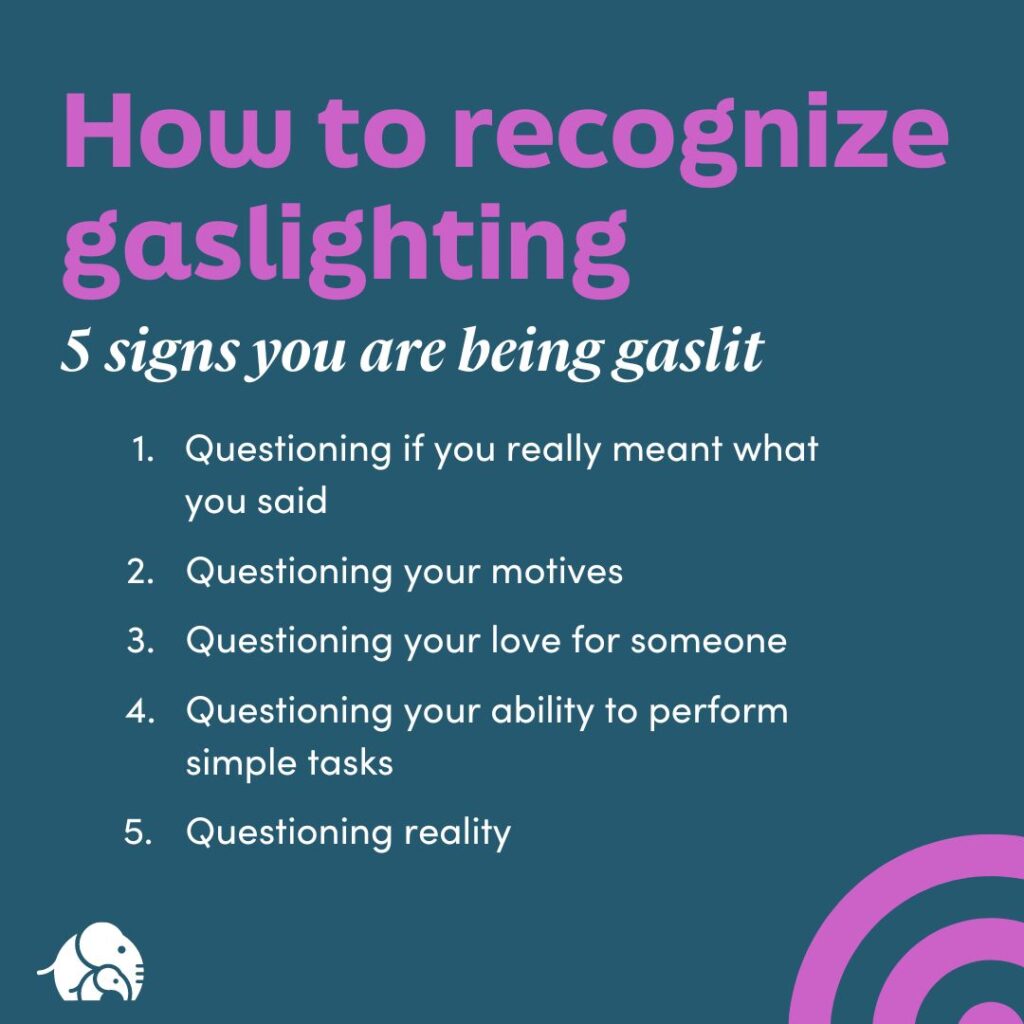Have you ever been in a relationship where you felt like you were constantly second-guessing yourself? Or perhaps your version of events never lines up with your partner’s? If so, you may be the victim of gaslighting – a form of psychological abuse that can wreak havoc on your mental health and leave you questioning your every thought, action, and even reality itself.
Every relationship has its challenges. After all, we’re all human and sometimes it feels as if we like to torment each other just for fun. But when it comes to psychological abuse, this is much more serious than the typical relationship obstacles, like arguing over who left an empty carton of ice cream in the freezer.
It’s difficult to spot someone in the act of gaslighting. But unless you want to be questioning your own sanity, learning the key phrases that may be used can help you to regain confidence in yourself and know when you’re being gaslit.
Have you been gaslit? Reach out to Ellie Mental Health and talk to a professional today.
What Is Gaslighting?

In a nutshell, gaslighting is an act of manipulation in which a person attempts to cause you to doubt yourself or cause confusion, often done for malicious personal gain. But the term itself stems from a 1944 film titled Gaslight, in which a woman’s husband attempts to make his wife think she’s losing her mind so he can steal from her by making the gaslights dim – then claiming it was all in her head. Thus today, we have the term gaslighting.
How to Identify Gaslighting: 5 Signs You’re Being Gaslit
If you feel like you’re constantly second-guessing yourself or questioning your reality, you might be experiencing gaslighting. Gaslighting is when someone manipulates you into doubting your own thoughts and feelings, making you feel like you’re losing it. So how do you identify it? Here are the main ways:
- Questioning if you really meant what you said.
- Questioning your motives.
- Questioning your love for someone.
- Questioning your ability to perform simple tasks.
- Questioning reality.
The problem with gaslighting is that if an abuser is savvy enough, you may never know you’re being misdirected. And this verbal sleight-of-hand can be quite convincing if you don’t know what to listen for.
Thankfully, we’re on to these “gaslighters.” They can’t hide forever! And, for the gaslit, we have a few key phrases to discuss that can be helpful indicators for when someone is attempting to pull the wool over your eyes.
For more tips on spotting the signs of a toxic friend, check out our other blog.
Examples of Gaslighting Behavior
Gaslighting is like a mind game where the manipulator messes with your head, leaving you second-guessing your reality. Need some help identifying gaslighting in your own relationships? Here are some common gaslighting behaviors:
- They play the denial card, brushing off hurtful words or labeling you as hypersensitive.
- They don’t take responsibility and act like you’re to blame.
- They twist facts, leaving you in a fog of confusion and self-doubt.
- They often downplay your feelings, invalidate you, and make you feel like you’re not important.
- They say things that make you question if something really happened or if your memories are true.
When you spot those actions, you have the opportunity to call them out and set boundaries to protect your mental well-being. By identifying gaslighting, you’re not only standing up for yourself but also creating healthier, more honest connections with the people around you. And that’s something we all deserve.
10 Common Gaslighting Phrases To Listen For
The language used for gaslighting is so common that it’s barely even noticed most of the time. And this subtle touch is what makes it so effective. For example, are you sure you meant what you said yesterday?
It’s this type of sneaky question that will instantly have you replaying events in your mind and questioning your intentions. Unfortunately, it gets even more complicated.
1. “It Was Just a Joke.“
Perhaps the most common gaslighting phrase, “it was just a joke” often occurs when a person says something actually mean, cruel, or hurtful. But this is also sometimes ambiguous. For example, consider the following:
“Why do you always do that? I swear you never made it through kindergarten.”
A phrase such as this could be taken as a joke, but it is also hurtful because it’s directly insulting your intelligence. And when you stand up to defend yourself, an abuser may claim it’s just a joke. But more commonly, they’ll attempt to make you think that they never said it at all. But don’t be fooled!
2. “You’re Just Being Paranoid.”
Another common phrase, accusing you of being paranoid is often a tactic used by someone who is being unfaithful, or by someone trying to make you feel at ease so they can proceed with their agenda. For example, if you ask why they came home so late, they may insist they came home at the usual time. If you ask why they never called to say they were going out, they may claim they called but you must have missed it
Additionally, this may also be accompanied by a subtle accusation such as: “You were gone for two hours the other day and I never questioned you about it. Should I start?”
The key takeaway here is if you have a gut feeling that something is wrong, do a bit of investigating first, find some evidence, and catch the gaslighter in the act.
3. “Do You Really Think I’d Make That Up?”
Anytime a sentence begins with “Do you really think…” it’s usually a clear indication of a gaslighting attempt. This is also an obvious attempt at making you question yourself, and your feelings about the person as well.
This type of question is defensive and is often used when an individual is accused of something, typically lying or embellishing. Essentially, this falls right in line with making you question your own reality and it’s a direct manipulation of your own understanding of trust. In addition, a question such as this can also make you feel guilty about even questioning them in the first place.
4. “You Hurt Me on Purpose.”
Have you ever had an honest mistake thrown in your face? Like that time when you forgot your friend’s birthday, but your friend won’t accept that you forgot and, instead, insists you did it on purpose – and then proceeds to tell you why you did it? This is another classic example of gaslighting.
In this situation, the other person is attempting to tell you why you did something – and your motivations behind it – instead of accepting your personal account of your own behavior.
The fact is, nobody is perfect. We all make mistakes. So, don’t get distracted or cause yourself more grief. Remember it’s about them, not you. So, stick to your guns and stand firm.
5. “We’ve Already Talked About This – I Can’t Believe You Don’t Remember.”
Another classic attempt at making you pause and question your memory. Did we really have this conversation? A question like this can weigh heavily on the mind.
When you begin rethinking past scenarios, this causes you to pause and lose focus of what you were upset about, doubt your own memory, and it may even make you drop the conversation altogether – and this is exactly the goal.
6. “Why Do You Always Have to Be Right?”
Everyone likes being right for the most part. Weren’t you so happy when you just knew who the new Bachelorette was and then found out you were right? Sighhh. But this statement is weaponized with projection. No matter what the conversation was about, this is a classic attempt at placing the focus on you instead of them.
When you hear this phrase, take a minute to pause and redirect. Chances are, they’ll try again to place the focus on you. And this is when you know you’re being gaslit.
7. “I’m Not the Only One. All Your Friends Think You’re Crazy Too.”
When it comes to gaslighting, making you feel isolated, alone, or powerless is a key tactic in attempting to make you question yourself. They may even say something like, “All of your friends know about you, too.” Or something similar. And this can be a hard statement to recover from because it instantly makes you question yourself and everyone around you, even your closest friends.
If this occurs, get the truth from your closest friends. Then you’ll know whether or not you’re being gaslit.
8. “You’re Crazy. That Never Happened.”
One of the most classic forms of gaslighting is pretending that something never happened, that whatever you thought occurred was all in your imagination. And they may even say something like, “You’ve always had a great imagination.” Or a similar variation.
If you come to the point when you’re hearing this statement often, chances are you’re being gaslit. And remember, facts trump false statements, so it’s always smart to think about key details when recalling a situation.
9. “You Know That’s Not What I Meant.”
Chances are, that’s exactly what they meant. They’re just trying to avoid taking responsibility for their words or the truth of their intentions. – and make you think that they meant something else entirely.
For example, if someone says, “You’re ridiculous.” That can probably be taken with a grain of salt. But if the statement is something like, “You’re always the problem.” And then they switch gears on you and try to tell you what you should think, or that they meant something else, hit the brakes, and make them get out of the car. Because this is a sure sign of gaslighting.
10. “If You Really Cared About Me, You Wouldn’t Even Think That.”
Using your own love against you is no way for a healthy relationship to operate. And this isn’t just a tell-tale sign of gaslighting, it’s a major red flag. Actually, a giant waving red flag – like the biggest red flag ever.
This attempt is simply to get you to think that you can’t even trust yourself, that you’re the one with ill intentions. And when you start second-guessing your love for someone, this becomes a slippery slope and may even result in damaging your other relationships.
Keeping the Lamp Lit
Though you may be keenly aware that something is just not right, if every time you raise a question and the other person tries to place the focus on you, this is a sure sign that you’re being gaslit – and that the person you’re with is manipulating you in order to get something they want or to keep something hidden.
How to Respond to Being Gaslit
If you feel you’re being gaslit, choosing how to respond should be done carefully and thoughtfully. And if you’re unsure, there are a few things you can try to keep the lamp lit and not second guess yourself:
- Speak to others about what’s happening
- Don’t argue
- Trust yourself
- Focus on actions – not words
- Separate yourself from the abuse
If you can’t remove yourself from the toxic friendship or relationship, or if you have and you need help coping, treatment and therapy from compassionate mental health experts may be the next best step in helping you to keep the lamp lit and move on from this type of abuse. And always remember, you’re amazing – trust us, we know, and you don’t have to deal with it alone.
Need help with overcoming abuse from gaslighting? Reach out to Ellie Mental Health and talk to a professional today.


